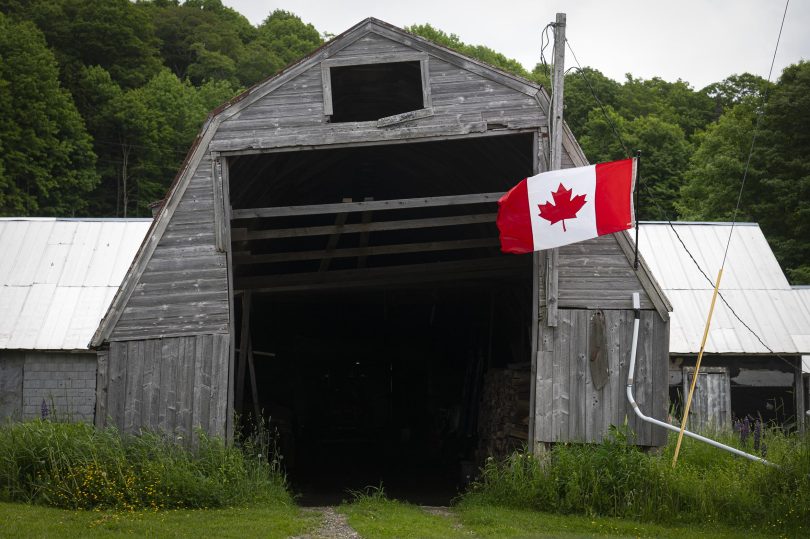Hill Farmstead has always had a hardcore contingent of Canadian fans. But even the award-winning brewery is facing boycotts from Quebecers frustrated with the Trump Administration.
Nestled in the hills of the Northeast Kingdom in Greensboro, just a few dozen miles from the northern border, Hill Farmstead has proved a must-stop destination for cross-border beer lovers passing through the area.
“For our 15 years, we’ve had a huge, huge Canadian following, particularly with our friends from Montreal,” said Bob Montgomery, Hill Farmstead’s director of brand quality.
In recent months, though, as President Donald Trump has inflamed tensions between the U.S. and Canada with his volatile tariff policies and threatening rhetoric, a mass movement to avoid the U.S. has taken hold in Canada, and the steady flow of visitors from up north has noticeably slowed.
Since March, Canadians have accounted for 25-30% less traffic on the brewery’s website than they usually do, Montgomery said. And some Canadians who had purchased tickets for the brewery’s sold out 15th Anniversary Celebration have said that they won’t be coming and are even attempting to resell their tickets en masse.
“Given the current circumstances, they’ve been choosing not to visit the United States and to spend their money at home instead,” Montgomery said.
President Donald Trump first sparked outrage among Canadians in February, when he imposed tariffs on most Canadian imports, a plan he has since adjusted and paused a handful of times. At the same time, he has made repeated rhetorical jabs at Canada, including threats to turn it into “the 51st state.”
Canada responded by hitting U.S. imports with retaliatory tariffs, and a number of Canadian provinces have pulled American products from their shelves.
But even as the tariff tit-for-tat has largely burned itself out, with both countries having repealed or delayed many of the levies they initially declared, a grassroots movement to boycott American goods and avoid travel to the U.S. has persisted in Canada, more inspired by Trump’s rhetoric and personality than his policies.

By the numbers
According to a recent survey from the Canadian Automobile Association—the Canadian equivalent of AAA—only 4% of Quebecers intend to visit the U.S. this summer, compared with 12% of survey respondents who said they planned to do so in 2024.
“Some Quebecers are just boycotting the United States while Trump is president,” said Shanny Hallé, a spokesperson for Tourism Eastern Townships. “There’s a message they’re sending that they want to keep their money here.”
The impacts of the boycott have been especially stark in Vermont, particularly in the northernmost parts of the state, where many towns and businesses that hug the northern border rely on Canadian tourism for much of their revenue.

About 750,000 Canadians visit Vermont each year, contributing about $150 million to the state’s economy, according to data from the Vermont Department of Tourism and Marketing. And although Canadians account for about 5% of tourists statewide, visitors from up north account for over 30% of visitors to the northernmost counties.
As peak summer season approaches, the loss is already being felt.
Canadian reservations at hotels and inns across the state have decreased by up to 45% since February, said Kim Donahue, president of the Vermont Lodging Association. And according to data from the U.S. Department of Transportation, border crossings from Canada into Vermont have plummeted in recent months. In March and April, roughly 30% fewer people crossed over into the U.S. by car than did at the same time last year.
Canadians usually represent roughly half of yearly visitors at Jay Peak Resort, according to president and general manager Steve Wright. In recent months, however, Wright said that the resort has seen a sharp decline in visitors from Canada, a trend he projects to continue through the year.

Located just south of the border, the Northeast Kingdom ski resort has for decades accepted Canadian currency at par with the U.S. dollar, a strong lure for Canadians, who can buy ski lift passes and waterpark admission tickets at a one-to-one exchange rate.
But according to Wright, ski season pass sales to Canadians for the upcoming winter are down about 35% from previous years.
Jay Peak is also home to an indoor ice rink, the venue for year-round youth hockey tournaments and camps that take place on an almost weekly basis. Of the 300 Canadian teams that usually participate in total, though, the resort is projecting that about half as many will show up this year.
“The amount of Canadian business that is on the books this year is about 50% off from where it should be,” Wright said.
Jay Peak has also seen widespread cancellations from Canadians who had bookings at its golf course, he said.
In recent weeks, Wright has personally spoken to dozens of Canadian customers who have chosen to steer clear of the resort this year, most of whom cited Trump’s rhetoric in explaining their decision.

“I think that, in combination with everything else, is giving Canadians pause as they plan their summer and fall and winter vacations,” Wright said.
Abby Long, executive director of Kingdom Trails, said that she’s had similar conversations with longtime patrons who have decided to boycott the fabled mountain bike trail network this year.
“Earlier this year, we were definitely getting daily emails and Facebook messages from our Canadian friends who said, ‘We’ve come for years to Kingdom Trails. Please know we love the trails, but we won’t be visiting this summer,’” Long said.
Currently, she said, just 12% of visitors to Kingdom Trails are Canadians, who represented about 24% of patrons at the same time last year.
“We love our Canadian friends,” she said. “It’s really disheartening.”

Rebuilding bridges
As Canadian tourism continues to decline heading into the peak summer season, Vermont businesses and state officials have started extending olive branches to their counterparts in the north with the hopes of enticing Canadians to return to the Green Mountains.
On Monday, Gov. Phil Scott met with the leaders of other New England states and the premiers of five Canadian provinces in Massachusetts to discuss ways of thawing tensions, although it’s unclear what concrete steps, if any, were agreed upon. A few hours later, the Burlington City Council voted to temporarily rename Church Street “Canada Street” for the summer.
Last week meanwhile, tourism leaders from northern Vermont traveled to Quebec for the inaugural meeting of the Cross Border Tourism Alliance, which was held at Léon Courville Vigneron, a winery in Fulford.
“We realize it’s a tricky time to be in tourism and hospitality right now, but Quebec and Vermont have always been close,” said Jeff Lawson, vice president of tourism for Hello Burlington, which put together the event. “It was sort of an opportunity to commiserate over the situation a bit.”
The new group hopes to hold meetings twice a year, a practice that Lawson hopes will foster longer term relationships, even if Canadians continue to boycott the U.S. for the foreseeable future.
“Very few of us on either side of the border knew each other even though we’re miles apart,” Lawson said. “We’re trying to do our best to establish and maintain new connections.”










